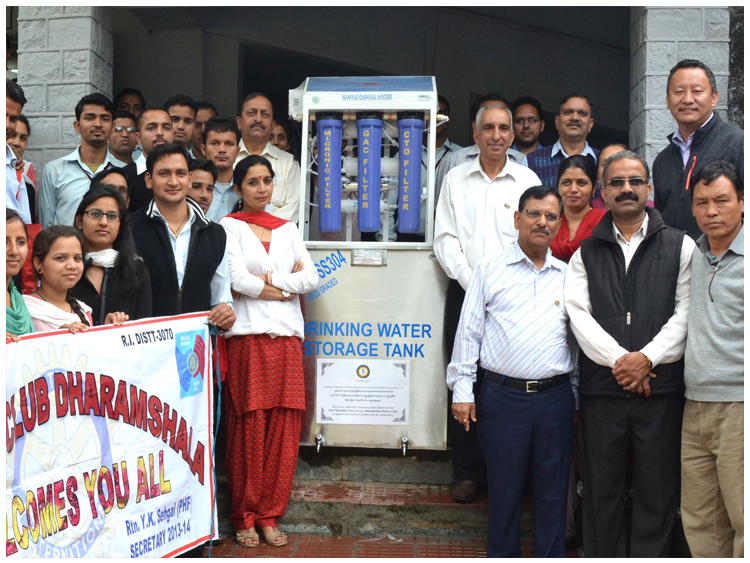Lha is unique in the range and quality of services it offers. These include free English, French and Chinese classes, cultural exchange programs, IT classes, vocational training, health and environmental awareness education, a wide array of volunteer opportunities distribution of clothes and medicine, a community kitchen and many other programs and activities. Through these rehabilitation resources and educational services, Lha facilitates an easy transition for the Tibetan refugee community to India. On a daily basis Lha serves over 250 people, hosts between 15 and 25 volunteers and provides many different services including on average 35-50 meals per day for financially disadvantaged people.
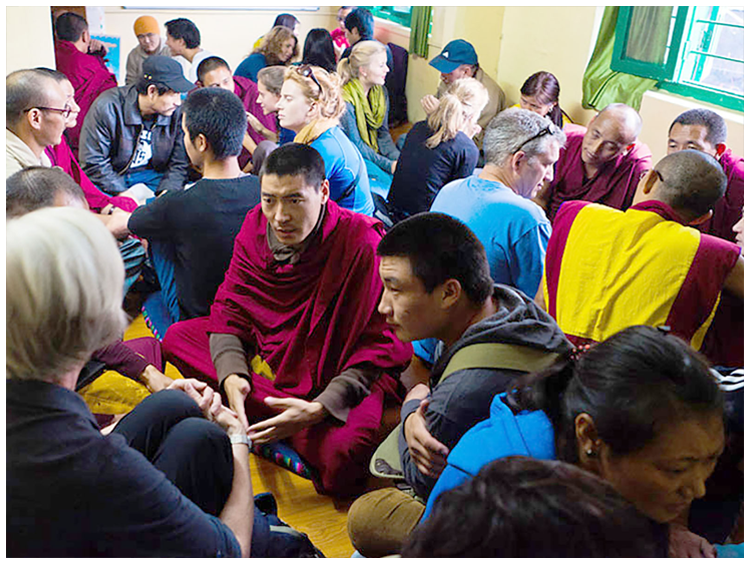 Language impacts on us all. It helps us express our feelings, desires and queries to the world. A human being’s ability to communicate through written and spoken language is what makes mankind unique. It is both practical and educational to learn a new language, especially when one relocates to another country.
Language impacts on us all. It helps us express our feelings, desires and queries to the world. A human being’s ability to communicate through written and spoken language is what makes mankind unique. It is both practical and educational to learn a new language, especially when one relocates to another country.
In the 1990s, hundreds of Tibetan refugees came to India. Most of the adults had not had the opportunity to study and learn a new language. We felt that not just Tibetans, but also the entire community, needed a place to learn English. Thus, in 1999, Lha started free language classes for Tibetan refugees, local Indians and people from other parts of the Himalayan regions.
The English language class was one of our earliest projects. The number of Tibetan monks, nuns and lay people coming to attend our English language classes has increased dramatically over the years and in 2004, we moved to a bigger classroom and improved our classroom resources. From 2004 to 2007, we were able to arrange four diverse levels of English classes and one English conversation class…. Readmore…
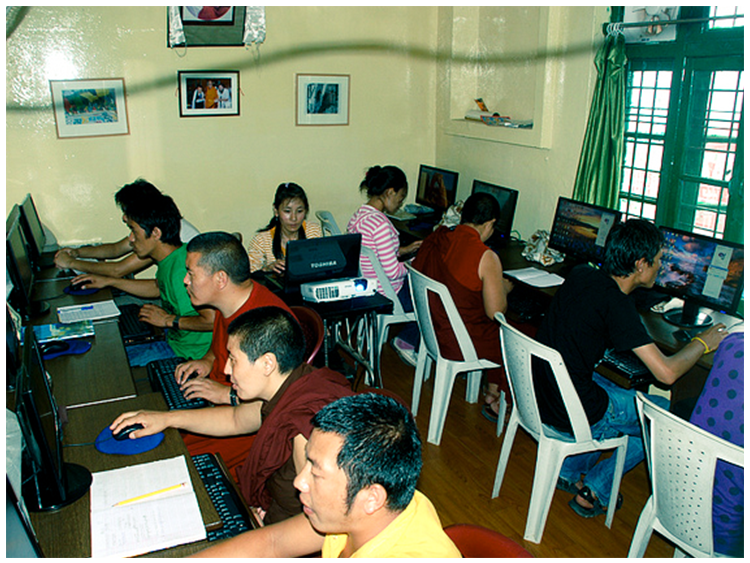 The 21st century is known as the age of computers, and today, computers have become essential. Hence, it is extremely important for Tibetan refugees to be computer-literate to make their lives easier and expand their job opportunities.
The 21st century is known as the age of computers, and today, computers have become essential. Hence, it is extremely important for Tibetan refugees to be computer-literate to make their lives easier and expand their job opportunities.
program with just a few computers and it is also one of our earliest projects. In 2008, we bought more than 10 new computers and introduced beginners and intermediate computer classes. Now, we have a well-established computer training program that aims to provide its students with viable job skills for the future. Here, we provide students with computer training in both a beginners course and more complex software skills in Adobe Photoshop, Illustrator, and InDesign as an intermediate course.
On a regular basis, 15 to 20 students attend our month long computer classes. So far, 230 students have benefited from our free computer classes and we have also created opportunities for some Tibetans working in nongovernment organizations to get the training free of cost…. Readmore…
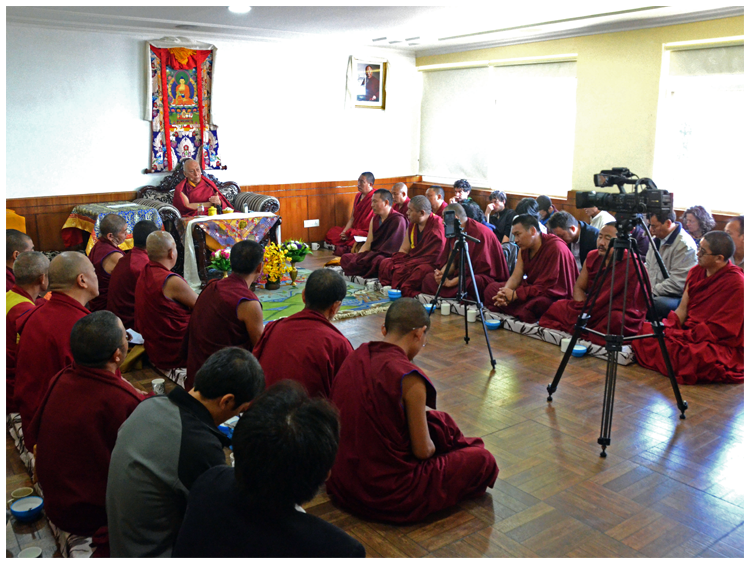 Our Educational Talk Program was started with the intention of keeping the community well informed and involved. To achieve this, we organize events within the community where children, parents, international students and the general public are invited to participate in expanding their knowledge on particular topics.
Our Educational Talk Program was started with the intention of keeping the community well informed and involved. To achieve this, we organize events within the community where children, parents, international students and the general public are invited to participate in expanding their knowledge on particular topics.
Over the years, we have arranged talks for the international student exchange groups by Tibetan parliamentarians on Tibet’s history, culture, and the current situation. Talks on Tibetan Buddhist philosophy are also included. Educational workshops by professionals are arranged for Tibetan students and parents based in Dharamshala.
Some of the most notable speakers include: His Eminence Professor Samdhong Rinpoche who gives two to three talks each year; Geshe Lhakdor (Director of the Tibetan Library) who is invited to give several talks each year; Dr Lobsang Sangay (President of the Tibetan government-in-exile) who has also given time to our cultural exchange groups, and Penpa Tsering (former Speaker of the Tibetan parliament-in-exile) who also gives several talks annually…Readmore….
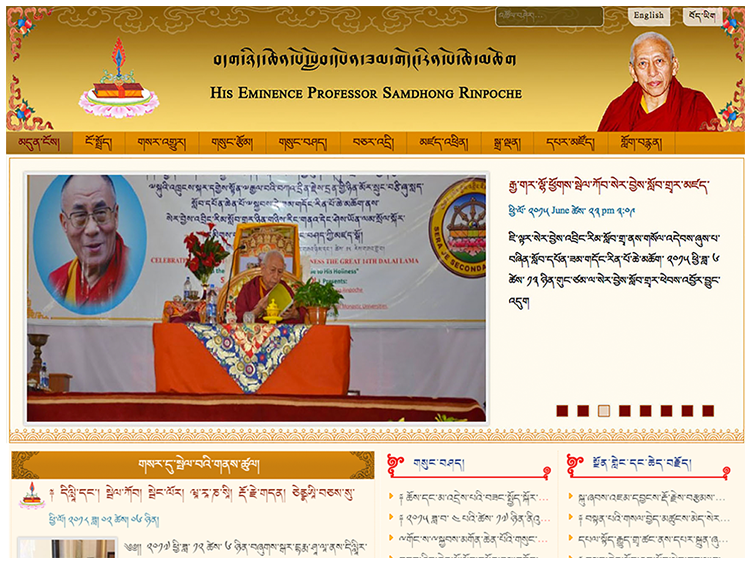 Since losing our country, the preservation of our language and culture has been one of the most critical areas of focus for Tibetans, both inside Tibet and in exile. Numerous individuals and institutes have worked extremely hard in this matter. Especially in Tibet, people risk their lives by raising their voices to save Tibet’s unique language and culture, through writing, songs and peaceful protests. Lha also believes that it is exceptionally important for us to preserve our language and culture. Hence, we have set up several projects over the years to contribute to the preservation and promotion of our language and culture.
Since losing our country, the preservation of our language and culture has been one of the most critical areas of focus for Tibetans, both inside Tibet and in exile. Numerous individuals and institutes have worked extremely hard in this matter. Especially in Tibet, people risk their lives by raising their voices to save Tibet’s unique language and culture, through writing, songs and peaceful protests. Lha also believes that it is exceptionally important for us to preserve our language and culture. Hence, we have set up several projects over the years to contribute to the preservation and promotion of our language and culture.
On November 5th 2014, on the occasion of His Eminence Prof Samdhong Rinpoche’s 75th birthday celebration, Lha launched a bilingual website www.samdhongrinpoche.com with the aim of contributing to the preservation of Tibet’s language, culture and heritage…. Readmore…
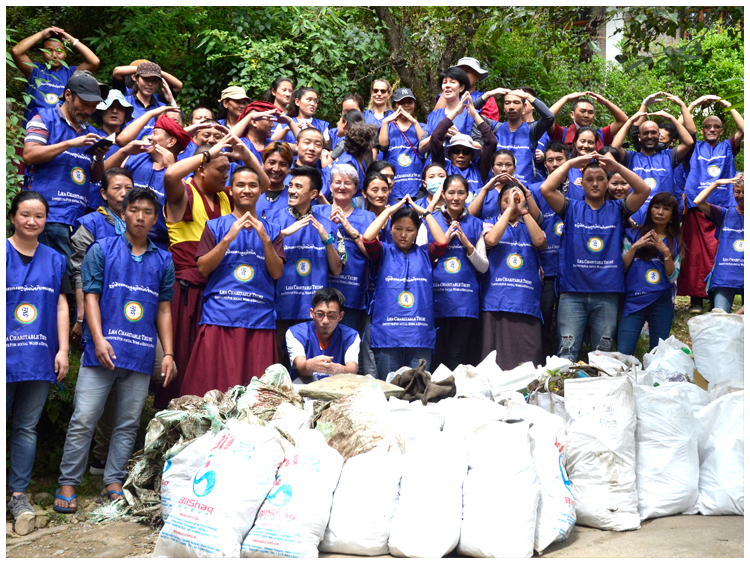 Protection of the environment is a moral responsibility of each and every inhabitant of this planet. Therefore, the ecology of the Tibetan plateau, situated at the heart of Asia and often referred to as the roof of the world, is of the utmost importance. The Tibetan plateau is the principal watershed of Asia. As many as 10 major rivers originate in Tibet, supplying millions of people in east and south Asia. It is estimated that around 85% of Asia’s population and 47% of the world population rely on the rivers which originate in Tibet.
Protection of the environment is a moral responsibility of each and every inhabitant of this planet. Therefore, the ecology of the Tibetan plateau, situated at the heart of Asia and often referred to as the roof of the world, is of the utmost importance. The Tibetan plateau is the principal watershed of Asia. As many as 10 major rivers originate in Tibet, supplying millions of people in east and south Asia. It is estimated that around 85% of Asia’s population and 47% of the world population rely on the rivers which originate in Tibet.
The Tibetan plateau is very fragile. Therefore, any disruption of the ecology is bound to have global consequences. Because of global warming, environmental groups are warning that there is an acceleration of the glaciers melting in the mountains of Tibet. This reaction could cut off water sources vital for large parts of many south Asian countries. One particularly alarming forecast warns that 80% of the glacial area in Tibet could disappear by 2035…Readmore…
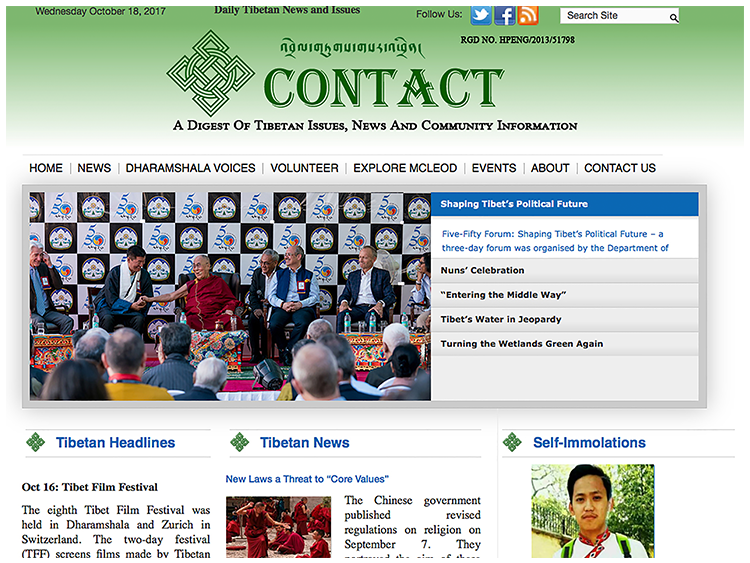 Contact is a monthly magazine published by Lha Charitable Trust and available free of charge. It has been recognized as a registered publication under the Office of the Registrar of Newspapers for India and the Indian Ministry of Information & Broadcasting since 2013. Contact is mentioned in Lonely Planet and other international travel resources. Contact was founded in 1997 and joined forces with Lha in 2004.
Contact is a monthly magazine published by Lha Charitable Trust and available free of charge. It has been recognized as a registered publication under the Office of the Registrar of Newspapers for India and the Indian Ministry of Information & Broadcasting since 2013. Contact is mentioned in Lonely Planet and other international travel resources. Contact was founded in 1997 and joined forces with Lha in 2004.
Contact magazine aims to disseminate news about Tibetans inside Tibet, the Tibetan community in exile and information about His Holiness the Dalai Lama’s activities worldwide. It is the only monthly English-medium news magazine on Tibetan issues which is distributed freely around Tibetan communities. Between 700 and 1,000 copies are printed monthly and circulated around Dharamshala and to various Tibetan settlements, schools, non-governmental organizations and diplomatic offices throughout India. Contact also posted to many organizations and individuals around the world and free access for all is available online… Readmore…
Since 2010, Lha has installed water filtration systems at 25 different sites throughout Northern India, in areas where a large number of people will benefit including schools, monasteries and other institutions. This has contributed positively to the health and wellbeing of Tibetan, Indian and other Himalayan communities. The total number of beneficiaries of the Clean Water Project to date is over 15,000.
The Importance of the Clean Water Project
There are a number of reasons why Lha has chosen to make clean drinking water a priority in Tibetan refugee communities throughout India.
Firstly, these communities suffer the double burden of polluted drinking water and water shortages. During the monsoon season (June to September), the influx of water overburdens water storage systems, ground water pipes and septic systems… Readmore…
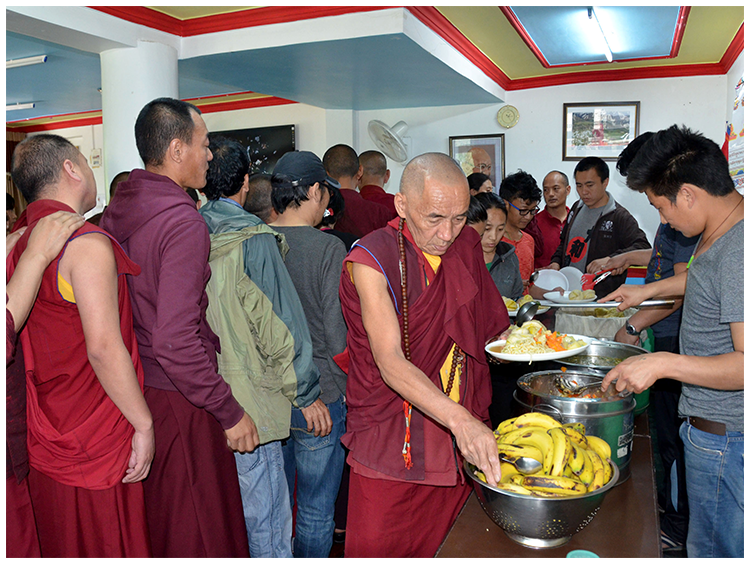 Being a popular tourist destination, Dharamshala attracts travelers from all over the world and while this has been beneficial in raising support for the Tibetan cause and promoting awareness of Tibetan culture and Buddhism, it has driven up the cost of living in the area. The effects of the high cost of living, along with unemployment rates and lack of affordable housing, invariably affect food security and access to nutritious, well-balanced meals. These issues in turn lead to various diseases related to malnutrition and general ill-health. According to a 2009 Tibetan survey, 44% of Tibetans living in Dharamshala suffer from chronic lifestyle diseases such as Type 2 Diabetes, gastritis, cirrhosis of the liver, heart disease and hypertension.
Being a popular tourist destination, Dharamshala attracts travelers from all over the world and while this has been beneficial in raising support for the Tibetan cause and promoting awareness of Tibetan culture and Buddhism, it has driven up the cost of living in the area. The effects of the high cost of living, along with unemployment rates and lack of affordable housing, invariably affect food security and access to nutritious, well-balanced meals. These issues in turn lead to various diseases related to malnutrition and general ill-health. According to a 2009 Tibetan survey, 44% of Tibetans living in Dharamshala suffer from chronic lifestyle diseases such as Type 2 Diabetes, gastritis, cirrhosis of the liver, heart disease and hypertension.
Being aware of the above issues, Lha decided to offer Tibetan refugees access to low cost, nutritious meals, while educating them about healthy eating and living and we set about addressing the obvious need for a community soup kitchen….Readmore…
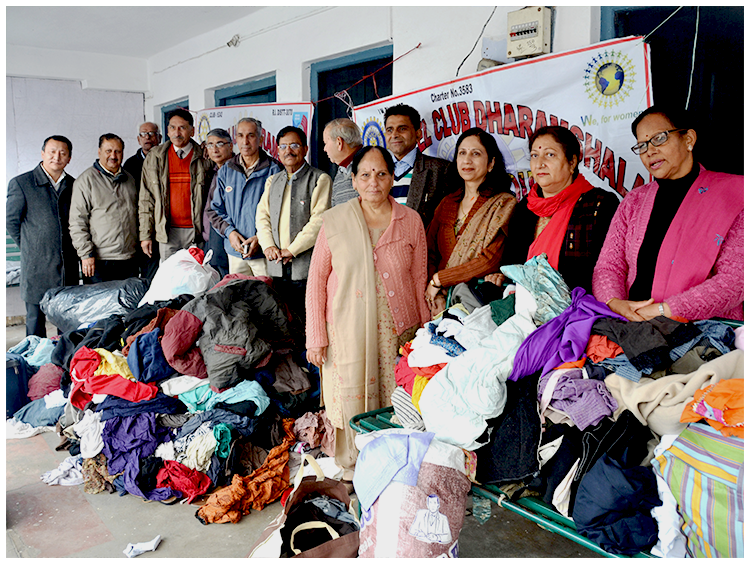 Since there are so many short and long-term visitors to Dharamshala, Lha has organized collections of their unwanted old or new clothing – from the student groups who take part in our Cultural Exchange Programs.
Since there are so many short and long-term visitors to Dharamshala, Lha has organized collections of their unwanted old or new clothing – from the student groups who take part in our Cultural Exchange Programs.
Every month, we pass on these items to the Dharamshala Rotary Club, which distributes them to those in need, particularly individuals living in poverty in lower Dharamshala. Lha also gives advance notice of clothing hand-outs in McLeod Ganj, so that the items donated are sure to reach those in need.
Since 2010, we have organized six clothing distribution events in McLeod Ganj for the general public – both Tibetans and Indians. The most recent was held on June 4th 2016, during which 28,000 new and used items were given to over 300 Tibetans and Indians in the community… Readmore..
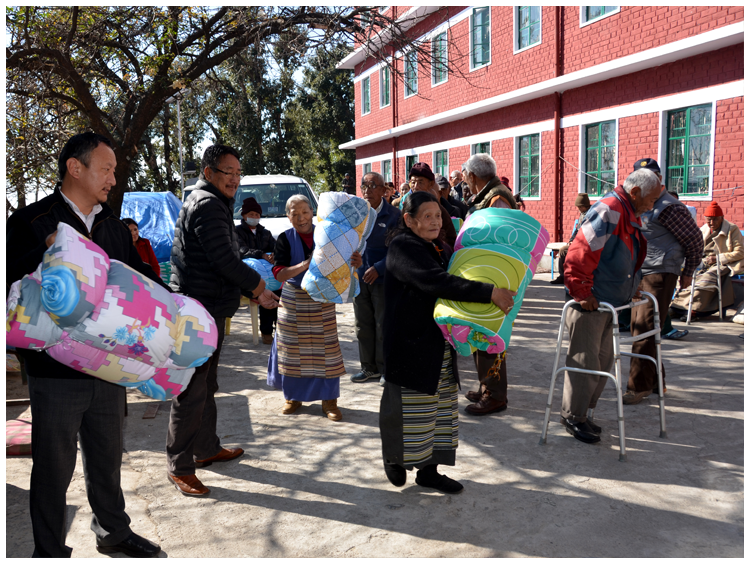 On January 6th 2015, Lha Charitable Trust distributed 130 super high quality micro-fiber quilts with extra cotton covers to the residents of Jampaling Elders’ Home. Thirty other needy people in Dharamshala also received them.
On January 6th 2015, Lha Charitable Trust distributed 130 super high quality micro-fiber quilts with extra cotton covers to the residents of Jampaling Elders’ Home. Thirty other needy people in Dharamshala also received them.
This free hand-out was honored by the presence of the Central Tibetan Administration’s Home Secretary, Mr Sonam Topgyal Khorlatsang, and the Additional Secretary, Ms Tsewang Dolma and Mr Wangchen, Director of Jampaling Elders’ Home. Mr Sonam Topgyal and Mr Wangchen expressed their heartfelt appreciation to Lha and encouragememt to continue their charity works in the best interest of the community.
In October 2015, Lha organized a two-week acupuncture treatment program at Jampaling Elders’ Home through our professional volunteers. 80 people were treated…. Readmore…
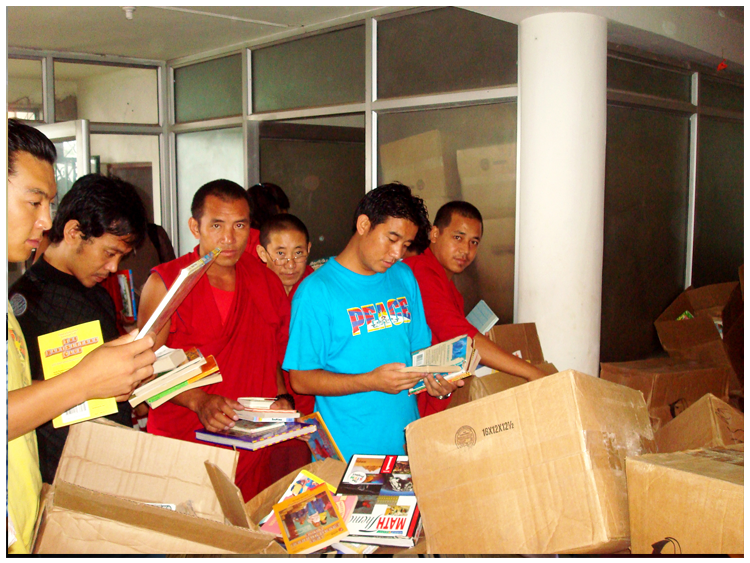 As part of our community service, Lha also requests books and stationery donations from individuals and organizations around the world. We give them to Tibetan and Indian schools as well as other community libraries in the Dharamshala area. In addition, we own a community library where many of the donated books are given out on loan.
As part of our community service, Lha also requests books and stationery donations from individuals and organizations around the world. We give them to Tibetan and Indian schools as well as other community libraries in the Dharamshala area. In addition, we own a community library where many of the donated books are given out on loan.
On November 5th 2016, on the 77th birthday of His Eminence Professor Samdhong Rinpoche, 500 copies of the 7th volume of the Collected Works of His Eminence Prof Samdhong Rinpoche were printed. It was published by the Lha Charitable Trust and handed out free of charge. From over the years, the book comprises Rinpoche’s speeches, writing and interviews. Earlier in 2014, Lha published 300 copies of the Felicitation Volume in gratitude to Rinpoche. We have also given away Rinpoche’s book on Tibetan Meditation. In 2008, Lha received 30,000 books…Readmore…
 Lha facilitates initiatives to improve community health by increasing awareness of the importance of hygiene and physical well-being. Donations of medicine are collected and distributed by Lha to public health centers, such as Delek Hospital and the Central Tibetan Administration’s Department of Health. Lha also holds workshops on HIV-AIDS and provides information on sexually transmitted diseases.
Lha facilitates initiatives to improve community health by increasing awareness of the importance of hygiene and physical well-being. Donations of medicine are collected and distributed by Lha to public health centers, such as Delek Hospital and the Central Tibetan Administration’s Department of Health. Lha also holds workshops on HIV-AIDS and provides information on sexually transmitted diseases.
Every year, Lha observes World AIDS Day and organizes events to raise public awareness of AIDs-HIV treatment and prevention. Public awareness activities include talks, distributing condoms, handing out pamphlets in three languages (Tibetan, Hindi and English), free blood tests, street plays and processions.
With hepatitis being a common health issue in the Tibetan community, Lha also arranges awareness talks to Lha’s adult students every year… Readmore…
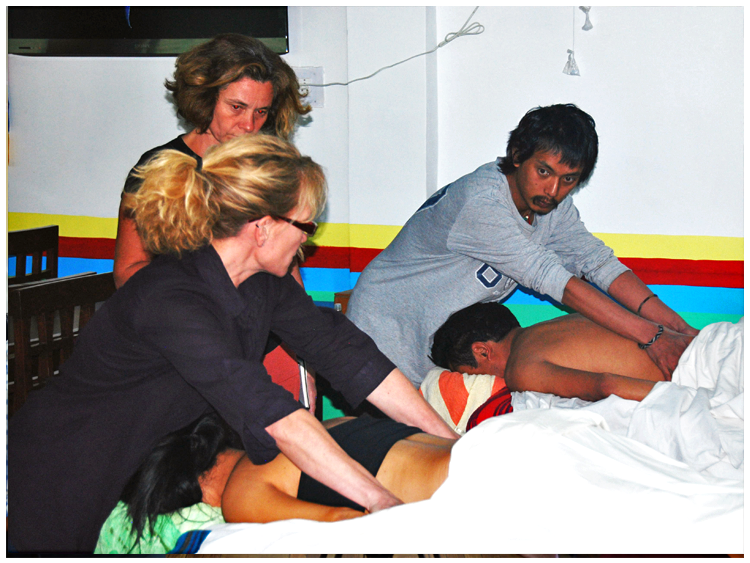 Massage therapy is a unique way to help others, by channeling positive energy to those who seek the peaceful pleasure of a relaxing massage. Lha has provided hands-on experience for its students, under the supervision of professional trainers. They encouraged Tibetan students to learn many forms of massage therapy. Once the educational foundation of massage therapy is established, students will see how much easier it is to learn new techniques.
Massage therapy is a unique way to help others, by channeling positive energy to those who seek the peaceful pleasure of a relaxing massage. Lha has provided hands-on experience for its students, under the supervision of professional trainers. They encouraged Tibetan students to learn many forms of massage therapy. Once the educational foundation of massage therapy is established, students will see how much easier it is to learn new techniques.
Lha massage therapy course were started in 2006. Initially it was founded as a means of generating some income for the organization when Lha was constrained financially. Since then Lha has organized many massage therapy courses in response to the huge unemployment problem in the Tibetan refugee community. Massage courses are conducted by professionally trained therapists, both Tibetan and international… Readmore…
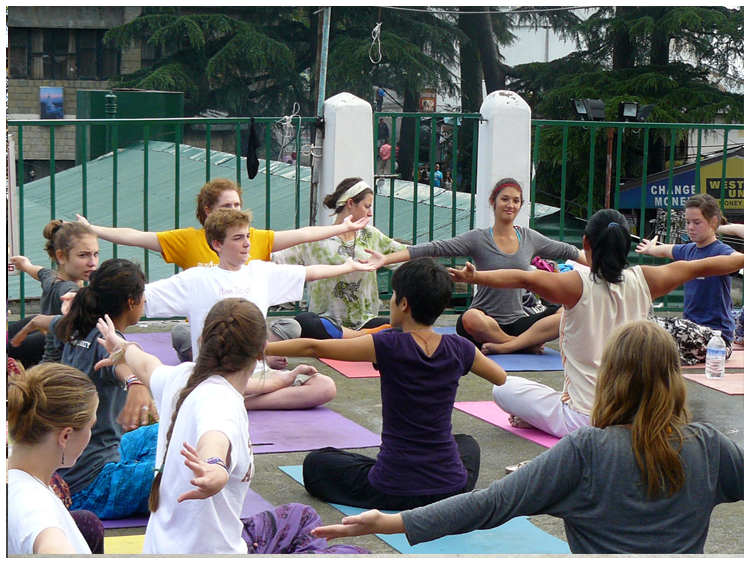 The ancient art of yoga is a fantastic way to keep fit, become more flexible and learn to be aware of one’s breathing. Since 2003, Lha has offered yoga classes, both Ashtanga and Hatha. The classes have been open on a drop-in basis. To date, many visitors have greatly benefited from Lha’s yoga wisdom!
The ancient art of yoga is a fantastic way to keep fit, become more flexible and learn to be aware of one’s breathing. Since 2003, Lha has offered yoga classes, both Ashtanga and Hatha. The classes have been open on a drop-in basis. To date, many visitors have greatly benefited from Lha’s yoga wisdom!
In 2003, Jampa Tsering, the Founder, then Director of Lha, started yoga classes at Lha. He was sent to south India specifically to learn yoga, where he received a certificate in yoga instruction and began yoga classes for Tibetans as well as backpackers. In 2005, another Lha staff member, Tashi Dorjee, was also sent to learn yoga. He taught yoga classes until July 2007. In 2009, Sonam Tsewang, a student of Lha, was sent to become a certified yoga teacher. Until 2013, more than 1,300 individuals have registered and their mental and physical health have improved as a result of the yoga classes offered at Lha.The beneficiaries of these classes include Tibetans, locals and foreigners…. Readmore…
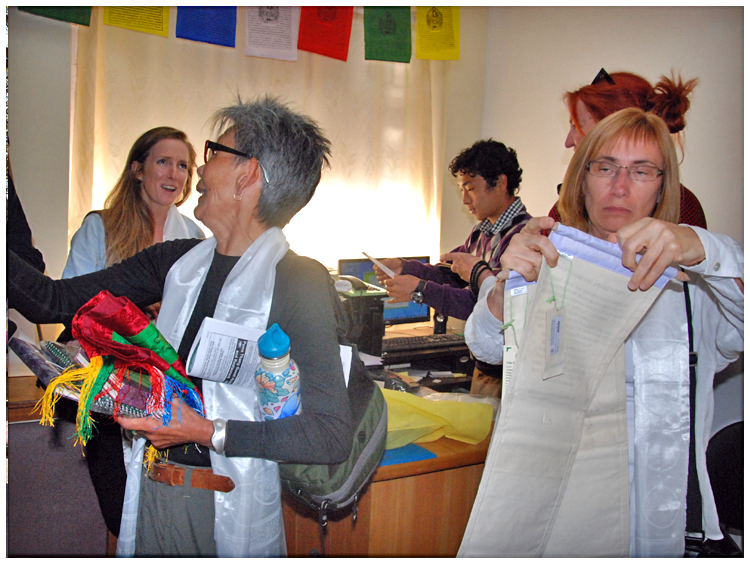 As an organization, we are constantly assessing our abilities and seeking growth. With that in mind, we feel it is very important to find ways to be self-sustaining rather than depending solely on external aid. To further this, we opened the Lha Tibet Fair Trade, Pvt.Ltd (LTFT) in 2014.
As an organization, we are constantly assessing our abilities and seeking growth. With that in mind, we feel it is very important to find ways to be self-sustaining rather than depending solely on external aid. To further this, we opened the Lha Tibet Fair Trade, Pvt.Ltd (LTFT) in 2014.
LTFT is a registered company with the Government of India’s Ministry of Corporate Affairs under the Companies Act of 1956 with the registration number U74140HP2013PTC000540. It offers a wide range of handmade Tibetan craft items – from handloom textiles and jewellery to home décor and personal accessories. There is also Tibetan art. In addition to being a retailer, LTFT is a licensed import, export and wholesale company.
By generating revenue, LTFT supports the needs of our non-profit organization, providing crucial resources for Tibetan refugees. We work to improve the standard of living and educational opportunities of local Tibetan….Readmore…
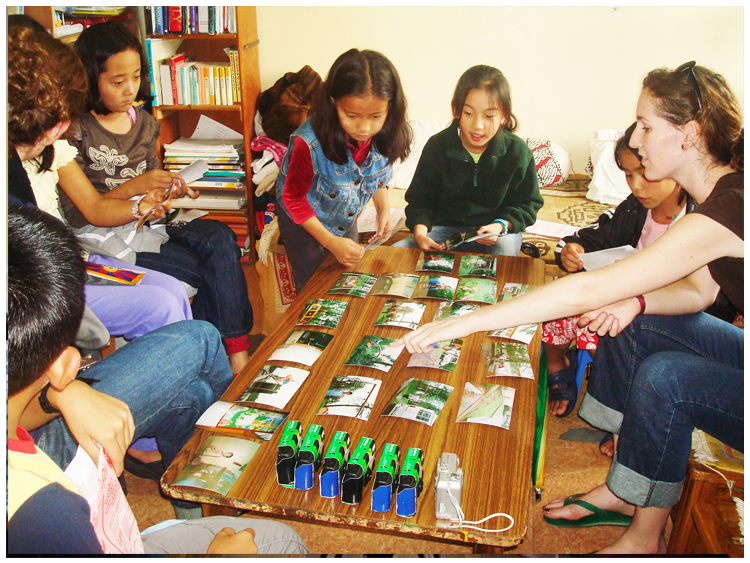 Since 2008, Lha has organized four photography workshops, from which 40 individuals have benefited. All the trainers are foreign professional photographers. The duration of each workshop was between one and two months. After the workshops, the trainees held exhibitions of their work and certificates were issued at the completion of the courses. The exhibitions include photos of backpackers, the natural scenic beauty of McLeod Ganj and local life. Some students managed to create their own websites to showcase their photography. In total, 67 people have graduated from Lha’s photography courses… Readmore…
Since 2008, Lha has organized four photography workshops, from which 40 individuals have benefited. All the trainers are foreign professional photographers. The duration of each workshop was between one and two months. After the workshops, the trainees held exhibitions of their work and certificates were issued at the completion of the courses. The exhibitions include photos of backpackers, the natural scenic beauty of McLeod Ganj and local life. Some students managed to create their own websites to showcase their photography. In total, 67 people have graduated from Lha’s photography courses… Readmore…
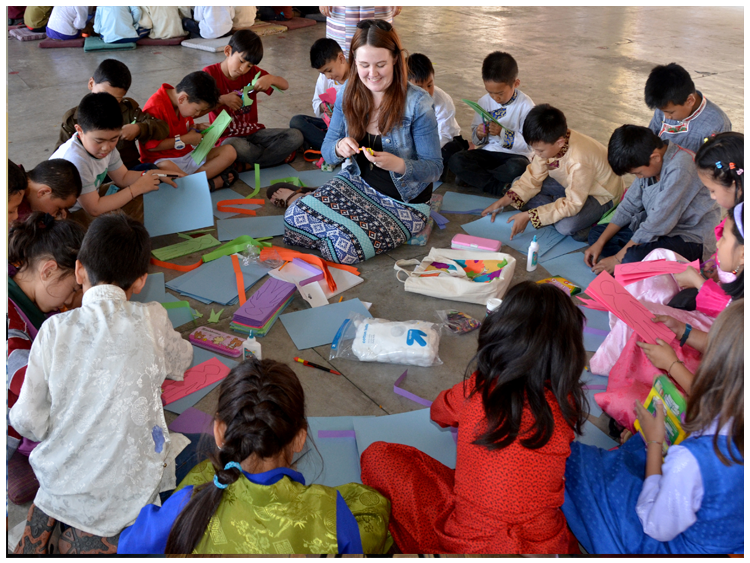 Since 2013, we have organized three creativity workshops for Tibetan children at Gangkyi Petoen Day School. The workshops were given by students and professionals who were part of Lha’s Cultural Exchange Program. More than 100 children, ranging from first to fifth grade students, participated. All of the art supplies were generously donated by Ms Kate Neuschaefer of artsforthenations.org, based in Colorado, US. Both the children and the exchange students enjoyed the workshops immensely. We continue to support students at Peteon Day School by providing workshop materials…. Readmore…
Since 2013, we have organized three creativity workshops for Tibetan children at Gangkyi Petoen Day School. The workshops were given by students and professionals who were part of Lha’s Cultural Exchange Program. More than 100 children, ranging from first to fifth grade students, participated. All of the art supplies were generously donated by Ms Kate Neuschaefer of artsforthenations.org, based in Colorado, US. Both the children and the exchange students enjoyed the workshops immensely. We continue to support students at Peteon Day School by providing workshop materials…. Readmore…
Read {hits}165{/hits} times

